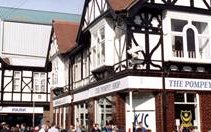An article from Lemmi, taking an ‘alternative look at the history of Pompey’ – read on for more.
It was close to 7 o’clock and the sun was just coming up as they disembarked in the harbour. Quickly, they formed a column and started to march towards the hill, its bright white chalk face now glowing in the dawn. As they approached they were confronted by what seemed to be thousands of men all naked and blue in colour. They charged and soon overwhelmed the hapless legionaries; the Roman General attempted to flee but was caught and brought crashing to the ground. He lay helpless under his horse and looked up into his assailants eyes who, before bringing his sword down, said ‘You’ll never take the Fratton End mush’. And so the 6.57 Crew were born.
The name of the leader of the Pompeyites is not recorded but he was known by the Romans as Gnaeus Pompeius Magnus, which translates as ‘Big Pompey Bastard’. He led his followers into Europe, their first encounter being with the Pariisi of Saint Germain. They fought their way down through Gaul and into Italy and eventually to Rome where, together with Gaius Julius Caesar and Marcus Licinius Crassus, Pompey formed the triumvirate, the best midfield Lazio ever had.
Unfortunately it all ended badly for Pompey as he lost his head whilst on an away trip to Egypt but the legend had been born and there were plenty of his followers left who brought that legend back home to the south coast of a small island province of the Roman Empire.
Centuries passed and the Romans withdrew to their homeland leaving the natives to their own devices. According to legend the Angles and Saxons invaded; it was a Tuesday at about half past four. The newcomers spread along the south coast until they reached an island between two large natural harbours. It was on this island that, according to the Anglo Saxon Chronicles, the Pompeyites defeated the Saxons at the Battle of Fratton Bridge. The chief of the Pompeyites, Linvius Primus, showed mercy unto the Saxon leader and, by the application of a woad tattoo of a star and moon, initiated him into the clan. The rest of the defeated warriors were similarly adorned and all swore allegiance to the men in blue.
The alliance prospered and formed the Kingdom of Wessex; culminating in the unification of England under the Kings of Wessex. The Kingdom was threatened many times by Danes and Norsemen; an army under the Harold Redknappson defeated the Norwegian army commanded by Harald Hardrada and Harold`s brother Tostig, Eorl of Chelsea, at the battle of Stamford Bridge. Harold was killed three weeks later in battle against the Normans, but some allege he was seen spurring his horse in the direction of London.
The Norman’s rule over the English was cruel and heartless, but the Pompeyites survived. Eventually their symbol was adopted by Richard the First on his crusades and the banner with the star and moon was carried to the Middle East. Portsmouth was given a charter in 1194 and grew into the home of the Royal Navy. It was as a result of this that the Pompeyites were able to spread across the globe, telling tales of Pompey wherever they went. So jealous were the French that they invaded and burnt the town four times but each time it was rebuilt, eventually being given stone walls and towers, forming Fortress Fratton.
Admiral Lord Nelson left the town for the last time in 1805 to defeat the French and Spanish in home waters; so decisive was it that the away goals rule was irrelevant. The defeat of the French paved the way for the growth of the British Empire and the Pax Brittannica. This relative period of peace allowed the British to develop and codify their sports and pastimes.
The early Pompeyite’s habit of kicking their defeated opponent’s head around was turned into the game of football that we all know and love today. These sports were exported around the world with the help of the men from Pompey until, eventually, everyone became better at them than we were.
The Twentieth Century brought war and strife. The rise of Hitler was caused by resentment of the Germans over their footballing defeat in No Man’s Land (4 – 2 after extra time), so they demanded a replay. They did try to flush out the FA Cup by bombing Portsmouth, but the resourceful Pompeyites hid it in a pub in the country.
A third defeat for the Germans, ironically 4 – 2 after extra time, made them resolve never to be beaten by the English again so they invented the penalty shootout, typical German ingenuity.
We now get to the Twenty First Century and Pompey is still with us, despite being on life support many times over the last few years. Hopefully we can now carry on the work of our ancestors and make heard the battle cry of those ancient, woad daubed tribesmen… ‘Play Up Pompey, Pompey Play Up!’
Written by Lemmi.
The views within this article are the views of the individual who wrote and submitted this piece, sometimes solely theirs. They are not necessarily shared by the Vital Pompey Site Journalists.





